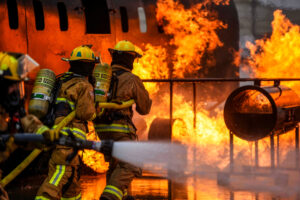On July 17, the U.S. Chemical Safety and Hazard Investigation Board (CSB) released an update on its investigation into a January 2023 explosion and toxic chemical release at the Honeywell Performance Materials and Technologies facility in Geismar, Louisiana. A reboiler at the facility exploded, leading to the release of over 870 pounds (lb) of hydrogen fluoride (HF) gas and nearly 1,700 lb of chlorine gas—both highly toxic substances.
The update revealed that the most recent mechanical integrity inspections of the reboiler before the explosion were in September 2020, when Honeywell used ultrasonic thickness testing, and in October 2021, when Honeywell conducted an internal visual inspection of the reboiler.
Based on the September 2020 inspection, Honeywell had estimated 1.1 years of remaining service life for the reboiler shell. Following the October 2021 visual inspection, Honeywell personnel recommended that the shell be replaced at the next shutdown opportunity.
In January 2022, Honeywell initiated a project to purchase a replacement reboiler shell. Management approved the project but didn’t purchase or install a replacement shell before the reboiler ruptured on January 23, 2023.
On that date, a boiling liquid expanding vapor explosion (BLEVE) occurred due to the conditions inside the reboiler at the time of failure. The BLEVE resulted in the sudden release of HF, chlorine gas, and other substances from the reboiler, the distillation column, and other ancillary equipment, according to the CSB.
Board investigators continue to gather facts and analyze several key issues, including:
- Honeywell’s mechanical integrity policies and practices
- Honeywell’s project management policies and practices
- Relevant facility, corporate, and industry standards
The CSB isn’t an enforcement agency and doesn’t issue citations or fines but makes recommendations to companies, industry organizations, labor groups, and regulatory agencies, including the Environmental Protection Agency (EPA) and Occupational Safety and Health Administration (OSHA). Board members are appointed by the president subject to Senate confirmation.
Following the incident, local officials closed nearby highways, and workers at the facility sheltered in place. Honeywell estimates the property damage to be approximately $4 million.
CSB urges chemical companies to prepare for harsh hurricane season
The CSB separately urged chemical manufacturers to prepare for a season of potentially more frequent and more powerful hurricanes and other extreme weather events.
The CSB has investigated two recent catastrophic chemical incidents caused by hurricanes:
- Fires on August 31, 2017, at the Arkema chemical facility in Crosby, Texas, due to heavy rain from Hurricane Harvey; and
- A toxic chemical release on August 27, 2020, at the Bio-Lab chemical facility in Westlake, Louisiana, where Hurricane Laura’s winds damaged buildings at the facility, bringing water into contact with trichloroisocyanuric acid (TCCA) stored at the facility.
In May, the National Oceanic and Atmospheric Administration (NOAA) predicted an 85% chance of an above-normal 2024 Atlantic hurricane season. Hurricane Beryl, the Atlantic Ocean’s earliest Category 5 storm on record, made landfall July 8 near Matagorda, Texas, as a Category 1 hurricane.
“Hurricane Beryl should serve as an early warning to chemical companies to act now to ensure their facilities can withstand the impact of a hurricane or other extreme weather events including wind, flooding, or storm surge,” CSB Chairperson Steve Owens said in a board statement.

